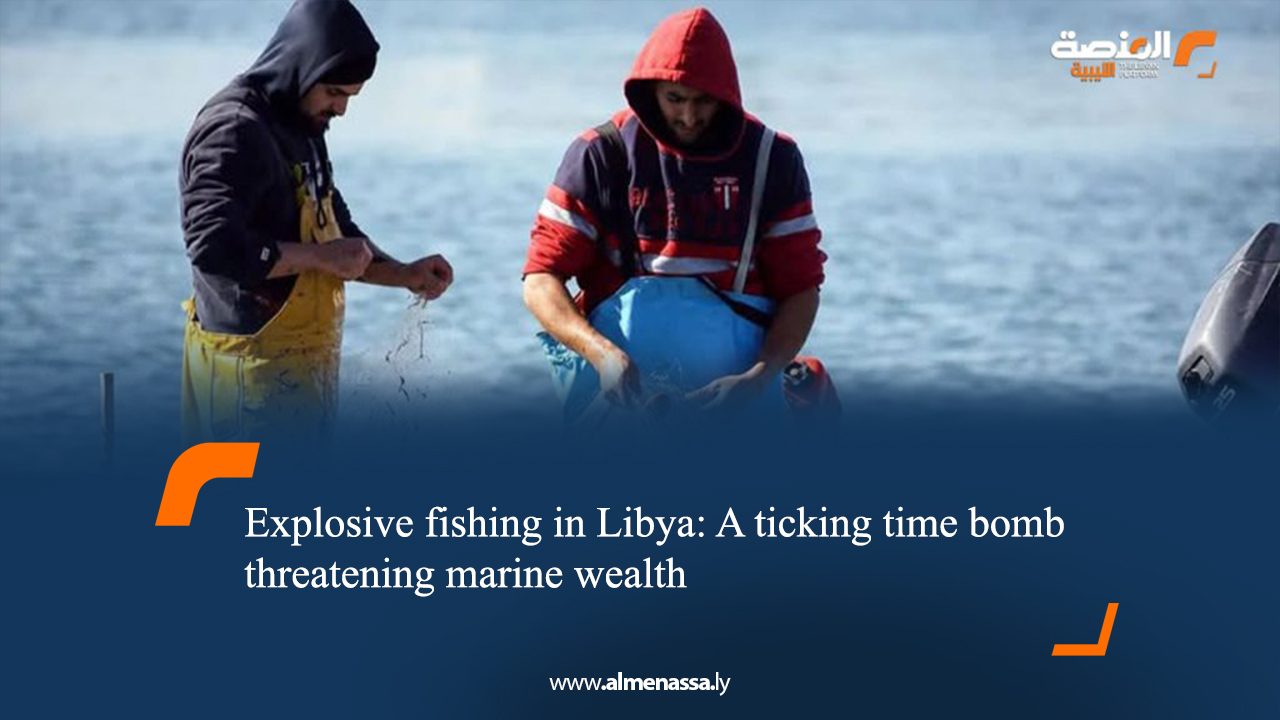Libya’s marine wealth is among its most important natural resources, but destructive fishing practices, such as explosive fishing, pose a significant threat to its marine life.
Illegal Practice
The Organization for Marine Sciences and Biology states that blast fishing, or dynamite fishing, is an illegal fishing method that uses explosives to kill or stun schools of fish for easy collection.
The organization explained that this illegal practice often leads to ecosystem destruction, frequently destroying coral reefs. This method is also dangerous for fishermen, resulting in accidents and injuries, despite its prohibition in the absence of oversight.
It clarified that blast fishing has become a hallmark of fishermen operating along the coasts, driven by profit at the expense of environmental destruction, with some even predicting a future decline in fish stocks.
Consequences
The Libyan Society for the Protection of Marine Life highlighted the impacts of explosive fishing, which include the destruction of coral reefs, affecting marine life including fish, sea turtles, and other animals. Furthermore, it has an impact on marine ecosystem.
Causes and Solutions
The society pointed out that explosive fishing has several causes, including greed and the desire to catch the largest quantity of fish, as well as ignorance regarding its negative impacts on the marine environment.
The Libyan Society for the Protection of Marine Life proposed solutions to combat blast fishing, including:
- Enforcing laws and legislation that prohibit explosive fishing.
- Raising awareness about the impacts of explosive fishing on the marine environment and its living organisms.
- Supporting sustainable fishing and providing alternatives to explosive fishing.
International Agreements and Deteriorating Conditions
Hamza Al-Hamdi, Director of the Marine Protection and Inspection Office at the Ministry of Marine Resources, previously stated in media remarks that overfishing and fishing with “Julatina” (explosives) have severe consequences, including the desertification of the marine environment and hindering its natural reproduction and growth.
Al-Hamdi added that overfishing is now subject to the Port State Measures Agreement, an international agreement adopted by countries to combat illegal fishing, which Libya acceded to in 2018. He explained that the Protection and Inspection Office is in continuous contact with the main operations room at seaports, informing them of all illegal cases seized.
Firas Al-Jabri, Director of the Information and Technical Documentation Office at the Ministry of Marine Resources, indicated that the problem of overfishing and illegal fishing is an old one, but has worsened recently due to deteriorating security conditions.
Al-Jabri further stated in previous remarks that the ministry, in cooperation with international organizations such as the UN Food and Agriculture Organization (FAO) and the Organization for Combating Illegal Fishing, is seeking solutions with relevant authorities, including the Coast Guard and the Naval Staff Headquarters, to find joint solutions to halt illegal fishing operations, thereby ensuring the protection of Libya’s marine wealth.
International Organizations and Infrastructure Development
Mohammed Omar Hafez, Director of the Administrative and Financial Affairs Department, revealed that a special committee to combat overfishing has been formed, collaborating with specialized international organizations, but it has not achieved any results yet.
He added that 70 million dinars were allocated in 2021 for the first time since 2011 to develop marine fishing infrastructure. This included the construction of wharves and a market in Derna, which is nearing completion, and a new headquarters in Benghazi.
Explosive fishing in the sea remains an environmental violation that threatens marine life and the marine environment, necessitating efforts to combat it and cooperation among various responsible state agencies and citizens to preserve marine wealth.


